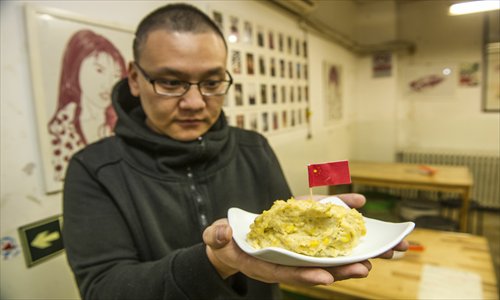Patriotic profits
Small businesses exploit nationalistic fervor for economic gain

A staff member at HOT BEAN with a dish called "The Diaoyu Islands Belong to China." Photo: Li Hao/GT
In a small eatery in Beijing's Dongcheng district, one of the most popular dishes is called "The Diaoyu Islands Belong to China."
A heaping of mashed potatoes topped with a miniature Chinese flag, the restaurant prepares 50 portions each and every day, and each and every day, it sells out.
"Every time I eat here, I order it," said one rowdy customer by the name of Xi Xuebin. He added that he always left the portion of potato around the flag uneaten, "so that the national flag won't fall off on the island."
Li Qian, the owner, said that a couple of patrons came up with the name around two years ago, when tensions over sovereignty of the islands were running highest. "Since then, a lot of customers have come to the restaurant to specifically request the dish."
The restaurant, named HOT BEAN, is just one of a handful of small businesses that are appealing to Chinese nationals' sense of patriotism in an effort to bolster profits.
According to an article that appeared on Internet news portal Eastday, in recent years dozens of vendors both online and offline have been selling an assortment of collectables with patriotic messages in the wake of China's territorial disputes with Japan and a number of smaller Southeast Asian countries.
In a well-publicized case, during the escalation of tensions between China and the Philippines over the sovereignty of Huangyan Island in 2012, discount coupon website meituan.com promoted a deal that would send Chinese citizens onto Huangyan Island to wave the Chinese flag. The promotion attracted over 70,000 buyers, before vanishing from the website after just one day. Although it has since been labeled a publicity stunt, it signaled the willingness of Chinese people to spend money for what they believed to be a patriotic cause.
Some commentators however, have criticized businesses who have tried to capitalize on people's nationalistic fervor for profit. A report published by China National Radio labeled such strategies as being "cynical" and "blasphemous."
Guo Dingping, professor of political science at the School of International Relations and Public Affairs of Fudan University, said that he was not surprised that some businesses would try to exploit people's nationalistic fervor for profit.
"After all, it's the job of businessmen to chase profits," he said. "But a business model based on patriotic feeling is not a sustainable business strategy."
"Feelings of patriotism tend to break out only during times of diplomatic conflict. So the motivation and desire to buy products that display one's patriotism are only fleeting and temporary," Guo said.
Guo was proven to be right, in at least one case.
In 2012, a restaurant in Zhengzhou, Henan Province called Yufeng Delicious Food latched onto a similar idea to HOT BEAN in Beijing, naming one of their dishes "Protect the Diaoyu Islands." The dish was made up of walnuts to indicate the islands, with eel to represent the surrounding ocean. On top of the islands was a miniature Chinese national flag.
According to Wei Jianbo, a manager at the restaurant, the dish was incredibly popular at first, selling on average 110 plates per day.
"A lot of our customers were more advanced in age, and couldn't eat the walnuts because they were too brittle for their teeth. But they would order the dish anyway, to express their patriotic feelings towards our country," said Wei.
The dish's appeal did not last.
"We had to pull the dish off the menu after one month, because most customers didn't like the taste, and it was a little on the expensive side," said Wei.